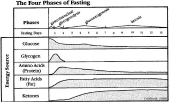posted 13 years ago
Well, here's my experience: For 13 years I tried to be vegan, and I was lethargic and feeling like crap. One Thanksgiving I succumbed, and the meat hitting my mouth was like Popeye eating spinach. Carbs put me to sleep, make me put on weight. Any kind of sugar, even naturally sweet vegetables, puts me on a roller coaster. Then I read that "eat right for your blood type" book and it all made sense. I come from hunter/gatherer stock. My metaboism is slow, my stomach is high in acids and just ferments grains. A little meat and vegetables and I feel super. Which kind of sucks because that makes it harder for me to be fully sustainable.
I'm not so sure about eating what your great great great great grandparents ate. My ethnic group eats pretty "traditional" and while they still forage a lot, I can't see that there was ever enough protein to be had in these unforgiving rock outcroppings to support many. At some point they settled down and became agrarian and the diet is 50% rice. 40% vegetables, and 10% meat. That's mostly imported meat, and I seriously question how anyone got enough calories in the past. I do okay eating traditional foods, but I eliminate the rice.
When I was young I had the privilege of spending a couple months working with an old man who was raised in a true homestead, the child of a pioneer family of "stump farmers" in Washington State. (the old growth tree trunks were too huge for their mules to remove) He told me how rough life was for everyone back then. Throughout the winter, everyone in the community subsisted off of smoked, spiced, and salted food, and that it was truly ghastly and monotonous: sometimes it wasn't much better than eating salty lard. I think we think of food from our grandparents as nourishing traditions, but really rarely eat what was eaten back before refrigerators...and then if we do it may seem like a treat because we're not forced to eat it every single day all winter long. Kim chi is considered THE traditional food of Korean people for hundreds of years and is constantly praised for its fermented health benefits, yet it is so high in salt it may cancel out the benefit of its active cultures. And Koreans have the highest rates of stomach cancer in the world, which I'm guessing that salt-ulcerated stomach lining irritated with red pepper capsicum probably contributes to. Preservation of limited food stocks back in the day often wasn't very nutritious or varied. I wouldn't want to live off of pickled herring for six months straight, either...
Similarly, I was raised on milk but am lactose-intolerant, though I never figured that out, but who could have imagined back then that most Asians can't process milk sugars? I don't think trading traditions is such a great idea. I wonder how highly processed foods like bread became staples in the first place, not thinking they are the best form of any grain for anybody of any ethnicity, beit ancestor or contemporary.
What you're calling traditional might actually be the recent past, and might not be any better than present day. Traditional doesn't always mean healthier, too. Go further back, and sustaining life was really hard. Protein was probably not a daily privilege.
So I'm speculating it probably depends on how way back your time machine is going...

 1
1




 1
1
















 1
1












 1
1














 1
1











